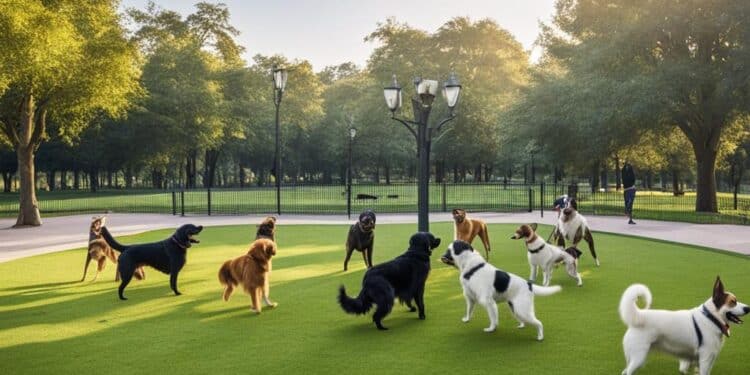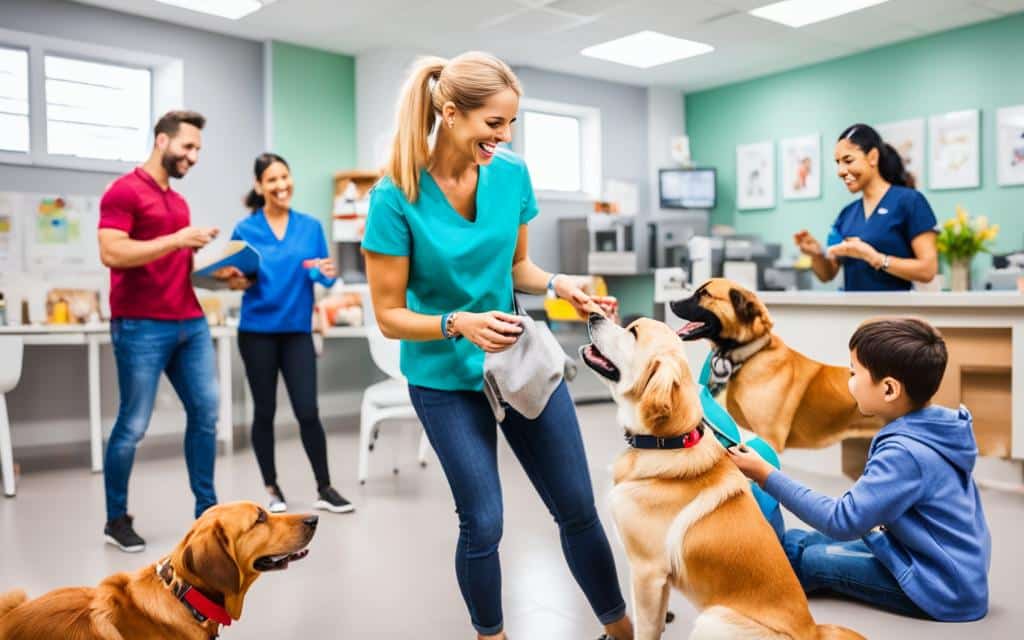The Importance of Socialization in Dog Training

Socialization is a key component of effective dog training, contributing to the shaping of behavior and the development of well-rounded canine companions. By exposing dogs to various social experiences, such as interacting with new people, animals, and environments, socialization helps build confidence, reduces fear and anxiety, and creates a healthier and happier dog.
Dogs are social beings by nature, and proper socialization allows them to learn how to navigate their surroundings and interact appropriately with others. This includes learning essential canine communication skills and understanding appropriate boundaries. When dogs are well-socialized, they are more likely to enjoy activities with other dogs and people, leading to a more fulfilling life.
Furthermore, socialization plays a vital role in preventing and reducing undesirable behaviors. Dogs who have been properly socialized are less likely to exhibit aggression, fearfulness, or anxiety in unfamiliar situations. They are more adaptable and better equipped to handle new experiences, resulting in a more balanced and well-behaved companion.
It is important to note that socialization should be an ongoing process throughout a dog’s life. While it is recommended to begin socialization during the puppy stage, older dogs can also benefit from socialization activities. Positive reinforcement and gradual introductions are key to successful socialization, regardless of the age of the dog.
In conclusion, socialization is an essential aspect of dog training. It builds confidence, improves behavior, and strengthens the bond between pet parents and their furry companions. By prioritizing socialization, dog owners can ensure their canine companions lead happy, healthy, and well-adjusted lives.
The Benefits of Socialization
Proper socialization builds confidence in dogs, allowing them to feel and act more confident in unexpected or unfamiliar situations. Socialized dogs are calmer and less fearful, leading to improved mental health. Additionally, socialization reduces stress and anxiety in dogs, which has positive impacts on their physical health. Dogs who have been socialized are more likely to enjoy activities with other dogs and people, resulting in a happier and more fulfilling life. Socialization also helps prevent and reduce bad behaviors, as dogs learn appropriate ways to interact with their environment.
| Benefits of Socialization | Description |
|---|---|
| Confidence | Socialization builds confidence, helping dogs feel more secure in new situations. |
| Fear Reduction | Proper socialization lowers anxiety and fear in dogs, leading to calmer behavior. |
| Physical Health | Socialized dogs experience lower stress levels, resulting in improved physical health. |
| Mental Health | Socialization contributes to better mental well-being, reducing anxiety and promoting overall happiness. |
| Dog Behavior | Through socialization, dogs learn appropriate behavior and develop positive interaction skills. |
By ensuring proper socialization, dog owners can help their furry friends thrive in various situations and enjoy a balanced and fulfilling life.
Socializing Puppies and Older Dogs
Socialization is a critical aspect of dog training that should ideally begin when dogs are young, between 3 and 12 weeks old. However, older dogs can also benefit from socialization, although it may require more time and patience. Regardless of age, positive reinforcement and gradual introductions play a crucial role in successful socialization.
When it comes to puppy socialization, their natural curiosity and eagerness to explore make it easier to expose them to new experiences. Puppies are more receptive to socializing and can quickly learn appropriate behaviors through positive interactions with other dogs, people, and different environments. It’s essential to provide them with a variety of positive experiences during this critical period of development to build confidence and shape their behavior as they grow.
On the other hand, older dogs may have missed out on early socialization opportunities, making it necessary to approach socialization with patience and understanding. Older dogs may be more set in their ways and may take longer to adapt to new situations. It’s crucial to introduce them gradually to new experiences, people, and animals, using positive reinforcement to reinforce desirable behaviors.
Positive reinforcement is a powerful tool in dog training and socialization. By rewarding desired behaviors with treats, praise, or play, you can motivate and encourage dogs to make positive associations with new experiences. This positive approach helps dogs feel safe and assured, facilitating their acceptance and adjustment to various social situations.
Regardless of the dog’s age, gradual introduction is key to successful socialization. Introduce new experiences, people, and animals in a controlled and gradual manner, allowing the dog to acclimate and feel safe. Rushing the process can lead to fear or anxiety, hindering the effectiveness of socialization efforts. Take your time to gauge your dog’s comfort level and modify the pace of introductions accordingly.
Remember that each dog is unique, and the socialization process may vary. Some dogs may require more time and exposure to become comfortable in social settings, while others may adapt quickly. Patience, consistency, and positive reinforcement are the keys to successful socialization, regardless of whether you are working with a puppy or an older dog.
Tips for Socializing Your Dog
Socializing your dog is an essential part of their development and well-being. By introducing them to new experiences and environments, you can help them become confident, well-adjusted companions. Here are some tips to ensure successful socialization:
1. Introduce One or Two New Experiences at a Time
When socializing your dog, it’s important not to overwhelm them with too many new experiences all at once. Start slow and gradually expose them to different situations, people, and other animals. This approach will help prevent anxiety and allow your dog to build positive associations.
2. Pay Attention to Signs of Anxiety
Dogs may show signs of anxiety during the socialization process. These signs can include panting, drooling, shaking, or excessive barking. If you notice any of these behaviors, it’s crucial to stop and give your dog a break. Pushing them too far can create negative associations and hinder their progress. Try again at a later time when your dog is more comfortable and relaxed.
3. Use Positive Reinforcement
Positive reinforcement is a powerful tool when socializing your dog. Reward good behavior with treats, praise, and affection. This positive reinforcement will help your dog associate socialization with positive experiences and encourage them to repeat desirable behaviors.
4. Consider Breed Tendencies and Age
Your dog’s breed and age can influence how they interact with others and respond to new experiences. Research your dog’s breed tendencies to better understand their social needs. For example, some breeds may have a higher prey drive or be more sociable with other animals. Additionally, consider your dog’s age in planning socialization activities. Puppies have different needs than older dogs and may require more frequent and gentle introductions.
5. Approach Socialization with Empathy for Rescues
Rescue dogs may have had traumatic experiences in their past, which can affect their socialization process. Approach their socialization with empathy, patience, and understanding. Give them time to adjust and never force interactions. Working with a professional dog trainer or behaviorist can also provide valuable guidance for socializing rescue dogs.
| Tip | Benefits |
|---|---|
| Introduce One or Two New Experiences at a Time | Prevents overwhelming and builds positive associations |
| Pay Attention to Signs of Anxiety | Allows for breaks and prevents negative associations |
| Use Positive Reinforcement | Encourages desired behavior and creates positive associations |
| Consider Breed Tendencies and Age | Adapts socialization approach to suit individual needs |
| Approach Socialization with Empathy for Rescues | Understand and support dogs with past traumas |
Remember, socialization is an ongoing process that requires consistency and patience. By following these tips and dedicating time to socialization, you can help your dog develop into a well-rounded, confident companion.

Socialization and Visits to the Animal Clinic
Socializing dogs at an early age prepares them for various situations, including visits to the animal clinic. Socialization is a crucial aspect of their development, teaching them how to interact with unfamiliar animals, people, and objects. By exposing dogs to these experiences, we can help prevent fear or aggression from arising during visits to the clinic.
Dogs that have undergone proper socialization exhibit more confidence and less anxiety in new environments. This is especially beneficial when visiting the animal clinic, as it reduces their stress levels and promotes a more positive experience for both the dog and their owner. Whether it’s a routine check-up or a medical procedure, a well-socialized dog is more likely to remain calm and cooperative during their visit.
Puppy socialization is particularly important in shaping their behavior as they grow. By gradually introducing puppies to the sights, sounds, and smells of the animal clinic, we help them develop a positive association with healthcare settings. This lays the foundation for a lifetime of comfortable vet visits, ensuring their physical and mental well-being.
Socialization for Fearful or Aggressive Dogs
For dogs that exhibit fear or aggression at the animal clinic, socialization becomes even more crucial. By carefully exposing these dogs to controlled environments that mimic clinic settings, we can work on desensitizing their negative responses. Through positive reinforcement and gradual introductions, we help them overcome their fears and learn to trust the clinic environment.
“Socialization helps dogs learn how to interact with unfamiliar animals, people, and objects, preventing fear or aggression.”
By addressing their fear or aggression issues through socialization, we can transform these visits from distressing experiences to opportunities for growth and positive reinforcement. This not only benefits the individual dog but also creates a safer and more harmonious environment for veterinary staff and other animals at the clinic.

In conclusion, socialization plays a crucial role in preparing dogs for visits to the animal clinic. By exposing them to new experiences and environments, we foster confident and well-behaved dogs who are better equipped to handle veterinary visits with ease. Whether they are puppies or older dogs, socialization promotes positive behavioral development and reduces fear and anxiety associated with clinic visits.
Conclusion
Socialization is a vital aspect of dog training that offers numerous benefits to both dogs and their owners. By prioritizing social interaction with other dogs, dogs can enjoy improved physical health through exercise and mental stimulation. Engaging in regular socialization activities also contributes to their behavioral development, teaching them proper manners and communication skills.
One of the key advantages of socialization is that it boosts dogs’ confidence and reduces fear and anxiety. This is particularly important for dogs who may have had negative experiences in the past or struggle with anxiety. Through positive social interactions, dogs become more well-adjusted and happier in their daily lives.
By making socialization a priority, dog owners can cultivate a harmonious relationship with their furry companions. Dogs who have been properly socialized are more likely to exhibit good behavior, have a better understanding of their environment, and enjoy healthier interactions with other dogs and people. Ultimately, socialization enhances the overall well-being and quality of life for both dogs and their owners.
FAQ
Why is socialization important in dog training?
Socialization plays a crucial role in dog training as it helps shape behavior and leads to healthier, happier canine companions. By exposing dogs to new people, animals, and places, socialization builds confidence and calms fear and anxiety. It also improves physical and mental health, enables dogs to enjoy activities with others, and helps reduce bad behaviors.
What are the benefits of socialization for dogs?
Proper socialization builds confidence in dogs, allowing them to feel and act more confident in unexpected or unfamiliar situations. Socialized dogs are calmer and less fearful, leading to improved mental health. Additionally, socialization reduces stress and anxiety in dogs, which has positive impacts on their physical health. Dogs who have been socialized are more likely to enjoy activities with other dogs and people, resulting in a happier and more fulfilling life. Socialization also helps prevent and reduce bad behaviors, as dogs learn appropriate ways to interact with their environment.
Can socialization be done with older dogs?
Yes, socialization can be done with older dogs. While it may take more time and patience, older dogs can still benefit from socialization. Positive reinforcement and gradual introductions are key to successful socialization, regardless of the dog’s age.
How should I socialize my dog?
When socializing your dog, introduce them to one or two new experiences at a time to avoid overwhelming them. If your dog shows signs of anxiety, it’s important to stop and try again at a later time. Stay calm and use positive reinforcement to encourage good behavior. Consider your dog’s breed tendencies and age when planning socialization activities. For rescue dogs, be aware that they may have past trauma and approach socialization with empathy and patience.
How does socialization at the animal clinic benefit dogs?
Socializing dogs at an early age prepares them for various situations, including visits to the animal clinic. Socialization helps dogs learn how to interact with unfamiliar animals, people, and objects, preventing fear or aggression. It benefits both puppies and older dogs, improving behavioral development and reducing fear and anxiety. Socialization is especially important for dogs that exhibit fear or aggression at the animal clinic, as it can help make these visits less stressful and more enjoyable for both the dog and their owner.






